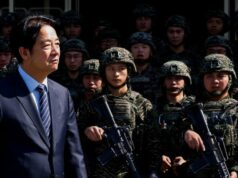Millions of Awami League supporters will boycott Bangladesh’s national election next year after the party was barred from contesting, ousted Prime Minister Sheikh Hasina said in an interview from exile in New Delhi.
Hasina, 78, said she would not return to Bangladesh under any government formed after elections that exclude her party, and plans to remain in India, where she fled in August 2024 following a deadly student-led uprising.
An interim government headed by Nobel peace laureate Muhammad Yunus has governed Bangladesh since Hasina’s ouster and has pledged to hold elections next February.
“The ban on the Awami League is not only unjust, it is self-defeating,” Hasina said in emailed responses to Reuters — her first media engagement since her dramatic fall from power after 15 straight years at the helm of Bangladeshi politics.
“The next government must have electoral legitimacy. Millions of people support the Awami League, so as things stand, they will not vote. You cannot disenfranchise millions of people if you want a political system that works.”
Hasina Hopes AL Will Be Allowed To Contest
Bangladesh has over 126 million registered voters. The Awami League and the Bangladesh Nationalist Party have long dominated the country’s politics, and the BNP is widely expected to win the upcoming vote.
The Election Commission suspended the Awami League’s registration in May. Earlier, the Yunus-led government banned all party activities, citing national security threats and war crimes investigations into senior Awami League leaders.
“We are not asking Awami League voters to support other parties,” Hasina said. “We still hope common sense will prevail and we will be allowed to contest the election ourselves.”
She did not say if she or anyone else on her behalf was holding any back-channel talks with Bangladeshi authorities to let the Awami League participate in the polls.
Spokespeople for Yunus did not immediately respond to requests for comment.
Hasina, credited with transforming Bangladesh’s economy but accused of human rights abuses and suppressing dissent, won a fourth consecutive term in 2024. That election was boycotted by the main opposition, whose top leaders were either jailed or in exile.
Hasina Faces War Crime Charges
The International Crimes Tribunal, Bangladesh’s domestic war crimes court, has concluded proceedings against Hasina, who faces charges of crimes against humanity over the violent crackdown on student protests in mid-2024.
According to a United Nations report, up to 1,400 people may have been killed during the protests between July 15 and August 5, 2024, with thousands more injured — most from gunfire by security forces — in what was the worst violence in Bangladesh since its 1971 war of independence.
Prosecutors also allege she oversaw enforced disappearances and torture of opposition activists through clandestine detention centres run by security agencies.
A verdict is expected on November 13.
Hasina denied the charges, saying she was not personally involved in the use of lethal force or other alleged crimes.
“These proceedings are a politically motivated charade,” she said. “They’ve been brought by kangaroo courts, with guilty verdicts a foregone conclusion. I was mostly denied prior notice or any meaningful opportunity to defend myself.”
No Plans To Return Home Yet
Despite the political turmoil, Hasina said the Awami League would eventually return to play a role in Bangladesh’s future — whether in government or opposition — and that her family need not lead it.
Her son and adviser, Sajeeb Wazed, who lives in Washington, told Reuters last year he might consider leading the party if asked.
“It’s really not about me or my family,” Hasina said. “For Bangladesh to achieve the future we all want, there must be a return to constitutional rule and political stability. No single person or family defines our country’s future.”
Hasina, whose father and three brothers were killed in a 1975 military coup while she and her sister were abroad, said she lives freely in Delhi but remains cautious given her family’s violent history.
A few months ago, a Reuters reporter saw Hasina taking a quiet stroll through Delhi’s historic Lodhi Garden, accompanied by two individuals who appeared to be her personal security detail. She acknowledged passersby with a nod as some recognised her.
“I would of course love to go home, so long as the government there was legitimate, the constitution was being upheld, and law and order genuinely prevailed,” she said.
Hasina’s departure triggered targeted violence against Awami League workers, though the streets have since remained largely calm. However, clashes erupted earlier this month during the signing of a charter for state reform.
(With inputs from Reuters)





